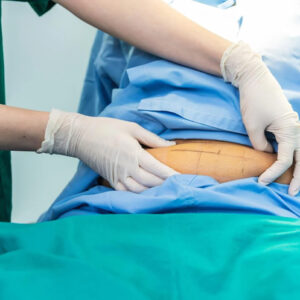
Revisional Bariatric Surgery Turkey
Revisional Bariatric Surgery Turkey is a surgery performed to renew and update obesity surgeries that result in failure or lead to serious complications with additional surgical operations. Revisional Bariatric Surgery can be performed with different methods depending on the type of the first obesity surgery the patient underwent. In the rest of our article, we will answer curious questions such as “How long does Revisional Bariatric Surgery take?”, “Why is Revisional Bariatric Surgery performed?” ” For whom is Revisional Bariatric Surgery not performed?” and “How is Revisional Bariatric Surgery performed?”. For detailed information about Revisional Bariatric Surgery in Turkey, please see the rest of our article.
What is Revisional Bariatric Surgery?
Revisional Bariatric Surgery is an operation performed to eliminate complications that develop after obesity surgery or to increase the success of the first surgery.
Why is Revisional Bariatric Surgery Performed?
In 10% of all obesity surgeries performed in the world, there is a possibility of not getting the desired result or encountering the opposite result. If a patient who has undergone obesity surgery loses less than 50% of the excess weight within 18 months, it can be said that the obesity surgery has failed. In addition, long-term postoperative complications and weight regain after weight loss are also indicators of failure. For this reason, bariatric surgeons can support failed restrictive surgical procedures with additional revision surgery with malabsorptive methods.
For whom Revisional Bariatric Surgery is recommended?
Revisional Bariatric Surgery is recommended for individuals who have undergone obesity surgery but have lost less than half of their excess weight within 18 years. This operation is not recommended for the following people:
- Drug addicts.
- Individuals with eating disorders.
- Individuals who refuse to take vitamins and nutritional support.
Revisional Bariatric Surgery Turkey is not recommended for these people.
What Does Revision Bariatric Surgery Mean?
Revision bariatric surgery is a secondary surgery performed after bariatric surgery in case of failure or complications related to the operation.
Is Revisional Bariatric Surgery Turkey Risky?
Revisional Bariatric Surgery Turkey does not cause any additional risk if it is performed by a specialized surgeon under ideal hospital conditions. However, of course, there may be various complication risks depending on the type of revision surgery. Your doctor will inform you about these risks before the operation.
Is Revisional Bariatric Surgery Painful?
Revisional Bariatric Surgery Turkey is performed painlessly because the patient is under general anesthesia throughout the surgery. He does not feel the procedures performed.
How Long Does Revisional Bariatric Surgery Take?
Revisional Bariatric Surgery usually takes about two hours, but this time may vary depending on the details of the operation.
How is Revisional Bariatric Surgery Performed?
Revisional Bariatric Surgery can be performed in different ways depending on the type of the first bariatric surgery the patient has undergone.
In patients who have undergone obesity surgery with the gastric bypass method, it may be detected in the future that the passage between the stomach and intestine has widened. In this case, the passageway is narrowed by endoscopy during revision surgery. Thus, food stays in the stomach longer, and the patient feels full for longer. In addition, the anus of the intestine is separated and reconnected by bypass. Thus, a significant part of the small intestine interacts minimally with the food consumed and digested. Thus, the calorie intake will be low, and the patient will lose weight.
In patients who have undergone gastric sleeve surgery, revision surgery can be applied if the desired level of weight loss has not been achieved or if weight loss has decreased as a result of the enlargement of the stomach again. In addition, the Roux-en-Y proximal technique can also be applied during gastric sleeve gastrectomy. The proximal gastric bypass technique may also accompany the revision surgery. Thus, the amount of nutrients absorbed from the small intestine is also restricted.
The Duodenal Switch, which is based on less contact of food with the intestinal surface, is made by separating the duodenum and reconnecting it to the distal part of the small intestine.
Near the exit of the stomach, an opening is created in the distal part of the small intestine. Thus, half of the food travels around the entire intestine, and half goes directly outside the intestine. In obese patients with diabetes, it is possible to avoid insulin intake with transit bipartition. Transit bipartition both reduces weight gain and helps control diabetes.
Turkey Revisional Bariatric Surgery Prices
Turkey Revisional Bariatric Surgery prices may vary depending on the details of the operation and similar factors. Your doctor will provide you with the necessary information about London Revisional Bariatric Surgery prices after planning a special operation for you.

















